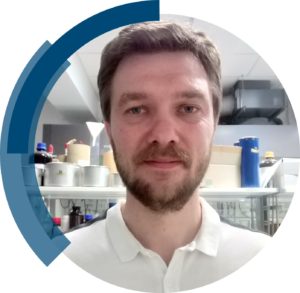We are excited to share the success of Nazar Rad’s first-time independent research article in ChemComm; ‘Effect of Na+ and K+ on the cucurbituril-mediated hydrolysis of a phenyl acetate‘ included in the full milestones collection.
Read our interview with Nazar
What are the main areas of research in your lab and what motivated you to take this direction?
Currently, our focus is in application of catalytically active macrocycles that mimic the behaviour of natural enzymes. Like natural enzymes, the macrocycles confine the substrate and accelerate its conversion. The great advantage of macrocycles over enzymes is their simple structure. Thus, examination of macrocycles allows us to elucidate enzyme behaviour and construct new functional systems.
Can you set this article in a wider context?
We demonstrate that abundant sodium and potassium cations can affect the catalytic activity of enzymes by directly binding to the active site. Therefore, when enzyme activity is studied in vitro using a buffer solution, the cation effect should be considered along with the ionic strength effect. Otherwise, the cation binding to the active site can reduce the concentration of the active form of the enzyme. I believe that taking the cation effect into account will solve many misunderstandings related to enzyme behaviour.
What do you hope your lab can achieve in the coming year?
Generally, uncompetitive inhibitors are more effective drugs than a more generic competitive ones. Meanwhile, their mechanism of action is not clear. Thus, we plan to study and elucidate the nature of uncompetitive inhibition using the macrocycle as a model system for enzyme behaviour.
Describe your journey to becoming an independent researcher.
My decision to become a scientist germinated when I started my second year at the university. After classes, I spent more time in the chemistry lab working as Undergraduate Research Assistant getting acquainted with organic synthesis. And when I joined a graduate school as a PhD candidate, I started planning majority of my research, performing experiments, and analysing the obtained results. I was deciding the research directions on my own. My supervisor helped me to develop my understanding of the field and senior colleagues in the lab always supported me with advice and encouragement throughout my doctorate career path. The experience gained while participating in internships in Poland and Germany has broadened my vision of science and deepened my understanding in the field. After a two-year industrial experience, I continued my academic career in Poland working as a post-doc. Shortly, I secured a funding for my first project and currently holding an Assistant Professor position at the Institute of Physical Chemistry, Poland.
What is the best piece of advice you have ever been give?
The best advice that always encourages me is: “The only man who never makes a mistake is the man who never does anything.” I have often heard this statement from my senior colleagues. These words helped me throughout my scientific career to keep working towards the set targets and learn from gained experience be it positive or negative. I believe, this is the one of the best advice for an early career scientist.
Why did you choose to publish in ChemComm?
The article shows how the sodium and potassium cations, which are common in every laboratory, can affect reaction rates. Therefore, I believe that the results should be of interest to the broad community of chemists. Furthermore, ChemComm is one of the most widely read interdisciplinary journals. I also appreciate ChemComm’s venue for rapid publication.
 |
Nazar Rad is originally from Ukraine, born in Lviv, 1985. After earning a MSc degree in Chemical Science from the Lviv National University after Ivan Franko in 2008, he continued graduate education as a PhD candidate at the same university in the group of Prof. M. Obushak. His PhD thesis was focused on the transformation of the nitro group during the nucleophile attack on nitroethenes and nitrothiophenes. Further, he studied the formation of aryltriflouroborate complexes with diazonium salts at Maria Curie-Skłodowska University (Poland, 2010–2011) as a Fellow of the Visegrad Fund. In 2011–2012, N. Rad joined the group of Prof. A. Schmidt at the Clausthal University of Technology (Germany) as a DAAD Fellow developing organocatalysts of the Hayashi-Miyaura reaction. Then, he gained experience in industry working as an analytical chemist at the Enzyme Company (Ukraine, 2015-2016). After PhD defense in 2016, he joined Prof. M. Mąkosza’s group at the Institute of Organic Chemistry of the Polish Academy of Sciences. In 2017, he accepted a post-doc position in the group of Prof. V. Sashuk at the Institute of Physical Chemistry of the Polish Academy of Sciences, working on light-controlled supramolecular switches. Currently, Dr. Rad holds the position of Assistant Professor at the Institute of Physical Chemistry, Poland. His research is focused on the application of macrocycles as enzyme mimics. |
Explore more ChemComm Milestones news and updates on our Twitter: @ChemCommun










